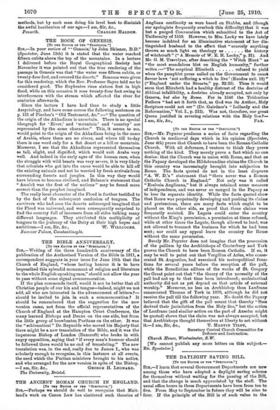THE ANCIENT ROMAN CHURCH IN ENGLAND [To THE EDITOR. Or
TER " SPECTATOR."] SIR,—Perhaps we should do well to recognise that Mait-
land's work on Canon Law has shattered such theories of Anglican continuity as were based on Stubbs, and (though our apologists frequently overlook this difficulty) that it was but a purged Convocation which submitted to the Act of Uniformity of 1559. However, to Mrs. Lecky we have lately become indebted for an illuminative statement of her dis- tinguished husband to the effect that " scarcely anything
throws so much light on theology as the history of witchcraft" (" A Memoir of W. E. H. Lecky," p. 31). And Mr. G. M. Trevelyan, after describing the " Witch Hunt" as "the most scandalous blot on English humanity," further writes :—" The sceptical Elizabeth refused to yield when the pamphlet press called on the Government to enact fiercer laws 'not suffering a witch to live' (Exodus xxii. 18) " ("England under the Stuarts," pp. 32-33). Thus it would seem that Elizabeth had a healthy distrust of the doctrine of Biblical infallibility, a doctrine already accepted, not only by Geneva, but also by Rome. For in 1546 the Tridentine Fathers "had set it forth that, as God was its Author, Holy Scripture could not err " (Dr. Gairdner's " Lollardy and the Reformation," Vol. I., p. 212). Was not, therefore, our great Queen justified in severing relations with the Holy See






















































 Previous page
Previous page